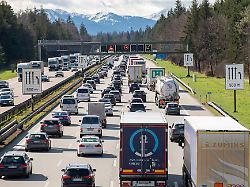improvements required
OECD report censures German transport sector
05/08/2023, 10:10 p.m
Experts from the OECD see a lot of positive things in Germany’s efforts towards natural climate protection. Measures in the corona pandemic and during the energy crisis are also praised. On the other hand, there are sharper tones on the subject of traffic.
Natural climate protection and good crisis management: The Organization for Economic Cooperation and Development (OECD) praises Germany in its current reports on the economy and the environment. But she also sees a great need for action – especially with regard to greenhouse gas neutrality. The federal government must act more ambitiously in order to achieve the climate goals. In particular, the transport sector must improve. “In the past, we were too slow when it came to climate protection. We now have to resolutely catch up,” said Economics Minister Robert Habeck at the presentation of the OECD reports in Berlin. “We can only achieve greenhouse gas neutrality by 2045 if we act in a timely and continuous manner.”
According to the experts, Germany is on the right track in the areas of natural climate protection and climate adaptation. But existing climate measures would have to be implemented more quickly and new measures taken. This is especially true in sectors that have not met their targets. Legal regulations are necessary, for example for buildings and heating, and subsidies that are as targeted as possible, especially for “green research”.
The experts also see a need in the transport sector. So there must be more public investment in rail transport – especially in local public transport, in order to improve the connection of sparsely populated areas to urban centers. In the past year, the transport sector clearly missed the legal targets for CO2 emissions. The construction sector is also one of the largest CO2 emitters in Germany.
OECD praises corona measures
“We have been doing business at the expense of nature for decades,” said Environment Minister Steffi Lemke. “Be it in the energy sector, in transport or in agriculture. These contaminated sites are costing us dearly. The OECD report shows this unequivocally.” For the first time, the economic report and the environmental assessment report of the OECD were presented together and handed over to both Economics Minister Habeck and Environment Minister Lemke. “Today, economic and climate protection policy can only be thought of together and must be shaped together,” said Habeck.
With a view to the current economic challenges, the OECD praised the good crisis management in German politics – for example in the measures taken in the corona pandemic and the energy crisis. In the current year, it expects a slight increase in gross domestic product of 0.3 percent and a growth rate of 1.3 percent for 2024. However, the OECD sees a need for action in the digitization of public administration, for example.
